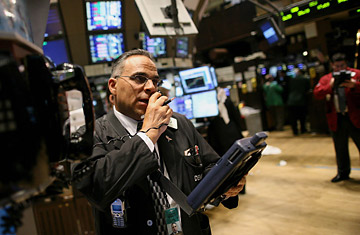
Traders work on the floor of the New York Stock Exchange
Many market experts expect this earnings season to do little to set the tone for the rest of the year. They assume that companies have been pounded into submission and that this has produced pessimism. In this climate, corporate management teams have decreased their forecasts to levels which they cannot fail to beat or match. It is like fixing a fight or a horse race, but it is legal.
The first big company to report earnings, Alcoa (AA), proved that the best guesses about how companies will perform this quarter will probably be true. Surprises will be scarce. Alcoa said that the first quarter would be a bad quarter. The company said it would lose money. In the first quarter, Alcoa lost $.59 after charges for discontinued operations. Reuters predicted that the loss would be $.54. This was close enough for government work. The stock dropped 3% after the announcement. In short, there was no shocking news because Alcoa made sure there would not be any. (See pictures of the Top 10 scared traders.)
The first quarter has been marked by almost no "earnings warnings." Companies that think they will miss either their own forecasts or those floating around on Wall St. traditionally tell the world that results will be worse than expected so investors can abandon their holdings a week or two earlier than they would if the company waited to put out results on its normal schedule. It is a perverse practice which is probably due to concerns by the SEC that a public corporation should not sit on really bad news any longer than possible. There have been very few warnings this quarter, which is some evidence that companies took what they believed was the worst case and encouraged investors to believe it.
By dropping forecasts to rock bottom, companies have taken some of the fun out of the guessing game that is played around earnings season. Firms may beat their forecasts, but most results will still be terrible by historical standards, so it will not be as if the market will cheer relatively poor performance on the back of predictions that cheat to the downside. Very few companies will show results that fall much below the market's worst guesses, which will bring some degree of comfort that earnings are not going from being the worst they have been in fifty years to the worst that they have been in seventy-five.
No management with any sense is going to use the announcement of its first quarter earnings to say that the balance of the year will be better than expected. The general economic conditions are still so bad that trying to figure out sales in almost any sector beyond the next several months is a game of chance and a reckless one.
That leaves investors and traders who look at earnings as essential to their decisions in a huge fog bank which does not show any sign of lifting. And, it won't. Buying and selling stocks is now based more on rumor and momentum than it has been at any time in recent memory. The last period like this may have been early 2000 during the Internet stock craze. This time around, obscure banks analysts can turn the market against the sector. News that Steve Jobs was seen at a 7-Eleven in Fresno can drive Apple (AAPL) up 10%.
When the quality of most of the numbers coming out of America's public companies stinks and CFOs are low-balling numbers, the Daily Racing Forum is the best source of information available. Professional securities analysts can take a one-year vacation. Or, at least those who still have jobs can.
— Douglas A. McIntyre
Find out 10 things to do with your money.
For constant business updates, go to 24/7wallst.com.
